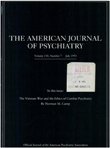Inverse relationship between CSF TRH concentrations and the TSH response to TRH in abstinent alcohol-dependent patients
Abstract
The authors performed the thyrotropin-releasing hormone (TRH) stimulation test and measured CSF concentrations of TRH in 13 abstinent alcohol-dependent subjects. They found an inverse correlation between the thyrotropin (TSH) response to TRH and endogenous CSF TRH concentrations. This finding supports the hypothesis that as the concentration of CSF TRH increases, anterior pituitary TRH receptor density decreases, resulting in a blunted TSH response to TRH stimulation.
Access content
To read the fulltext, please use one of the options below to sign in or purchase access.- Personal login
- Institutional Login
- Sign in via OpenAthens
- Register for access
-
Please login/register if you wish to pair your device and check access availability.
Not a subscriber?
PsychiatryOnline subscription options offer access to the DSM-5 library, books, journals, CME, and patient resources. This all-in-one virtual library provides psychiatrists and mental health professionals with key resources for diagnosis, treatment, research, and professional development.
Need more help? PsychiatryOnline Customer Service may be reached by emailing [email protected] or by calling 800-368-5777 (in the U.S.) or 703-907-7322 (outside the U.S.).



